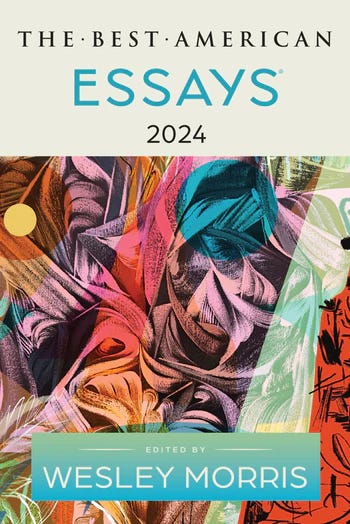On the curve of forgetting
The Best American Essays 2024 edited by Wesley Morris and Kim Dana Kupperman

Let me be honest. The only reason I’m reading this anthology is because my name is listed in the back as one of the “Notable Essays and Literary Nonfiction of 2023.” Which is another way of saying that series editor Kim Dana Kupperman included my lyric essay “Taiwan 1969” in the two packages she shipped to guest editor Wesley Morris.
Each a manila folder taco. Spread width-wise, the shell cupped a casserole of tessellated paper, some printed out, most so diligently extracted from the soft teeth of perforation. They were essays. And in addition to being selected, their presentation also looked picked, as in pulled up from earth, like vegetables. [Kim] secured the whole thing with two extra large rubber bands, one red, one purple. Two months later, came taco number two. Same idea. Different rubber bands.
Introduction by Wesley Morris to The Best American Essays 2024
So really, all I’m doing is to check out the competition.
What It’s About
Confession number two: I thought this would be an easy review. There are, after all, only twenty-four essays in BAE 2024. All of them were published in English between January 2023 and January 2024 in a nationally distributed North American journal. Some of the essays come from the top-flight magazines (The New Yorker, The Atlantic, Harper’s Magazine) so there was a decent chance I had already read a few. I thought I could hide behind the mission of this Substack, which is to speak only of lyric essays. Frankly, I didn’t expect to find many in BAE 2024.
What I did expect, I found: straight-up reportage by Jennifer Senior on the institutionalization of the mentally disabled, history of the first Holocaust memorial as told by James McAuley, Teju Cole’s take on the Vermeer exhibit at the Rijksmuseum, and lots of memoir.
Directly or indirectly, memoir or not, all of these essays look at the fallibility of memory. The title of this book review is taken from Sallie Tisdale’s lyric essay “Mere Belief.” The “curve of forgetting” was devised by the German psychologist Hermann Ebbinghaus in 1885 to measure how quickly we lose information learned.
The loss is exponential; more than half of what we lose is gone in an hour. The curve flattens, but within a few days a person will forget about 70 percent of any information acquired, unless she makes a conscious effort to remember.
Then I got to the astonishing essay by Kathleen Alcott called “Trapdoor.” Guest editor Wesley Morris describes it as “shockingly engineered.” Publisher Harper’s Magazine categorizes it as memoir. Is this a lyric essay or not?
The Nerdy Stuff
The operative word here is engineered. Also studies in construction, power arising from the daring of their form which Morris uses to describe other entries in this collection. Confession number three: how can you tell when a knock-it-out-of-the-park essay is or is not a lyric essay? Turns out, I’m not always sure.
Things I do know:
A lyric essay does not have to be a “personal” essay, i.e. reveal some dark secret about the author or touch a still-suppurating wound. “Storm Damage” by Anne Marie Todkill touches on climate change and the war in Ukraine, botany and WWII, branching and branching as a river does. I’ll call it a fractal essay.
Whether I like an essay is not contingent upon it being a lyric one. I was deeply moved by Yiyun Li’s “If Not Now, Later,” which is straight-up memoir about gardening after her son committed suicide.
Segmented essays are in fashion. Five of the essays included in BAE 2024 (half of all the lyric ones) fall into this category. But what I prefer, as a reader, is an essay where the form (or organizing principle) serves the function (or narrative). An essay about a father obsessed with endtimes and an author tender with hopes for her children needs to be told in the form of a helix as Courtney Miller Santo does in “If/Then.”
What I Liked
I don’t think Kupperman or Morris bothered themselves about achieving a correct balance between lyric and non-lyric essays in BAE 2024. They were certainly not concerned with labeling those essays. They were looking for good. In Kupperman’s eyes, that’s the privilege of witnessing an author refine a thought on the page. For Morris, the reaction is more visceral: Jesus fucking Christ, oh man or “a bunch of vowels leaving my mouth like slot machine coins.”
So let me leave you with a quote from “1978,” an extract of a memoir-in shards by Amy Margolis. The narrator has come from Kansas City to the Big Apple to begin her formal training as a dancer at the Martha Graham School of Contemporary Dance. She’s single, young, heterosexual and so, of course, she finds herself two gay men as her new best friends.
Paul has come here to do me this favor. There is nothing for him in it except the opportunity for convention, which is a novelty. Paul is a faggot. “Say it darling,” he tells me. “With gusto.” I cannot say it. Nor can I say what I am—a virgin—but I don’t have to because it’s there for all the world to see, like a giant pineapple growing out of my head. Every week my virginity sprouts a new, garish fruit, and soon I will labor under the weight of a headdress as high as Carmen Miranda’s. I want it off me.





Thank you for this, Karen. Especially with my focus with blinders on short fiction, I might well have never opened the Best Essays, though I love powerful creative non-fiction. So I very much appreciate your introduction to that volume. Congrats on haivng your 2023 lyric essay mentioned between its illustrious covers!!
Great 💎💕📚💕💎